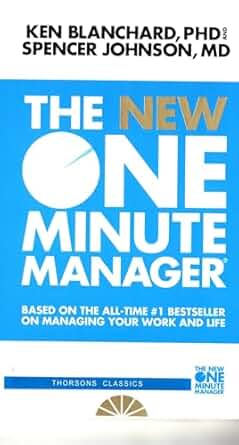“The One Minute Manager” by Kenneth Blanchard and Spencer Johnson
Who is it for? for those looking for time-tested insights for effective management
“The One Minute Manager” by Kenneth Blanchard and Spencer Johnson is a classic in management literature, renowned for its simplicity and practicality. This concise book presents a straightforward system for effective management that is based on three key techniques: One Minute Goals, One Minute Praisings, and One Minute Reprimands. The story, told through a young man searching for an effective manager, encapsulates these techniques in a narrative format, making them accessible and easy to understand.
Blanchard and Johnson advocate for a management style that is neither autocratically nor democratically dominated. Instead, they propose a balanced approach that is results-oriented but also people-friendly. The One Minute Goals are about setting clear expectations and objectives; One Minute Praisings are about catching people doing something right and offering immediate praise; and One Minute Reprimands are about giving direct and constructive feedback promptly after an error.
The primary challenge for readers is implementing the book’s techniques in diverse and complex real-world work environments. While the principles are straightforward, adapting them to different teams, individuals, and situations requires a nuanced understanding of human behaviour and organisational dynamics. Additionally, balancing the brevity and simplicity of these techniques with the depth of real-world management challenges can be tricky.
Another challenge lies in the book’s brevity itself. While “The One Minute Manager” is praised for its conciseness, some readers might find that it oversimplifies complex management issues. Modern workplaces often face challenges that require more in-depth approaches, and adapting the one-minute techniques to these contexts might not always be straightforward.
Furthermore, the book focuses mainly on individual interactions, and implementing its principles at an organisational level can be more complex. Creating a wider culture that reflects the One Minute Management philosophy requires consistent practice and reinforcement.
In summary, “The One Minute Manager” offers valuable, time-tested insights for effective management. The challenge for readers lies in adapting its succinct, straightforward principles to the nuanced and multifaceted nature of modern management and leadership. For those seeking a foundational guide to management principles, Blanchard and Johnson’s book is a compelling read.

